Queen of Katwe
 for thematic elements, an accident scene and some suggestive material.
for thematic elements, an accident scene and some suggestive material.
Reviewed by: Blake Wilson
CONTRIBUTOR
| Moral Rating: | Better than Average |
| Moviemaking Quality: |
|
| Primary Audience: | Family Adults Teens |
| Genre: | Sports Biography Drama Adaptation |
| Length: | 2 hr. 4 min. |
| Year of Release: | 2016 |
| USA Release: |
September 23, 2016 (select—52 theaters) September 30, 2016 (wide—1,242 theaters) DVD: January 31, 2017 |
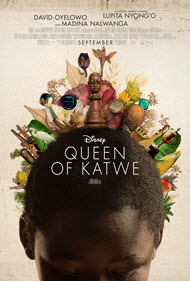

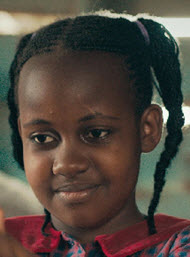

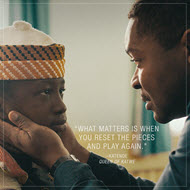
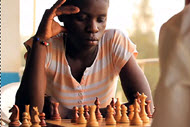
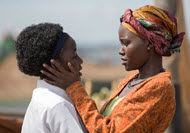
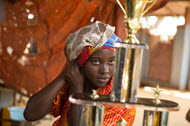
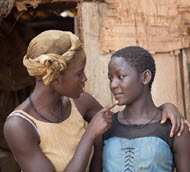
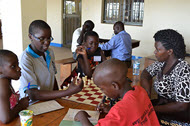
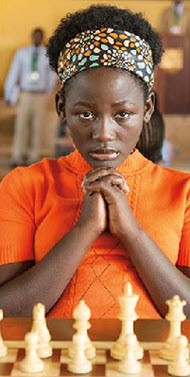
the importance of mentoring young people
disrespect of girls by some boys
working hard to achieve goals
POVERTY—What does the Bible say about the poor? Answer
poor in the Bible
overcoming poverty
importance of humility compared to pride and over-confidence
How did Jesus greatly humble himself for us? Answer
| Featuring |
|---|
|
Madina Nalwanga … Phiona Mutesi Lupita Nyong'o … Harriet Mutesi David Oyelowo … Robert Katende Ntare Guma Mbaho Mwine … Tendo Russel Savadier … Russian Chess Official Esther Tebandeke … Sara Katende Taryn Kyaze … Night, Phiona’s sister Peter Odeke … Barumba Charity Rose Pimer … Tebandeke Samuel … Young Doctor Maurice Kirya … |
| Director |
| Mira Nair — “Amelia” (2009), “The Namesake” (2006), “Vanity Fair” (2004), “Monsoon Wedding” (2002), “Kama Sutra: A Tale of Love” (1996) |
| Producer |
|
ESPN Films Walt Disney Pictures Walt Disney Productions |
| Distributor |
“The size of your dreams must always exceed your current capacity to achieve them.”
That quote, from Liberia’s president and Nobel Peace Prize winner Ellen Johnson Sirleaf, is the first thing audiences see during the trailer for “Queen of Katwe,” based on the life of Phiona Mutesi, a preteen growing up in the poor area of Katwe in Kampala, Uganda.
Phiona (played by newcomer Madina Nalwanga) helps make the money necessary for her family to survive by selling maize. One day, Phiona comes across a church. Looking into the building, she witnesses kids learning how to play chess. After being invited in and fed porridge, Phiona returns often and develops an admiration for the game.
Much to the dismay of Phiona’s mother, Nakku (Oscar-winner Lupita Nyong’o), the ministry, led by Robert Katende (David Oyelowo), decides to enter the kids in a chess tourney at King’s College. After failing, at first, to get them in, due to the kids’ background, Robert raises enough money to enter. In the tournament, Phiona wins the gold medal, and is soon recognized as a prodigy.
The cinematography and camera angles, especially during the chess matches, are especially well-executed. The script by William Wheeler effectively brings a strong balance between the triumph of an underdog story with the authenticity of the film’s true story basis. Wheeler gives rich characterization to the story’s primary characters.
Nalwanga is impressive in her acting debut. As a Uganda native, she delivers all the qualities necessary to bring her character to life. Oyelowo shows a lot of versatility as the Coach. He effectively goes between being fun and engaging for the children, as well as being an inspiring motivator for Phiona. Nyong’o, who is getting Oscar® buzz for her role, commands the screen in every scene she’s in. Behind her character’s strong willpower lies a tormented spirit that has suffered with a rough past.
Positive Messages
In real life, Phiona is a professed Christian. While the “Queen of Katwe” doesn’t explicitly discuss her faith, nor does it show much of the ministry she’s a part of (Agape Sanctuary Ministry), Christian faith is implied throughout the film. One theme that I came away thinking about was the importance of sticking to Godly values. Phiona and her older sister, Night, briefly talk about God. Phiona asks, “Do you think God still cares about us?” Night responds, “I don’t think God cares about us”.
In the movie, Night leaves her family for a sexually promiscuous lifestyle (at least that is suggested). But this path is shown to lead to negative consequences, as her boyfriend leaves her and she becomes pregnant. Meanwhile, Phiona and her family stick to their values. Even though they have it rough, they are blessed for adhering to their values. The secular lifestyle Night embraces is shown to be a negative, while the humble, faith-based life is shown to be a positive. One verse in Proverbs reminded me of this comparison of values:
“Better is a poor person who walks in his integrity than one who is crooked in speech and is a fool.” —Proverbs 28:6
This message applies to Phiona, as well. Midway through the film, Phiona becomes over confident and becomes obsessed with chess. In addition, her exposure to more of the modern world causes her to develop a selfish and disrespectful attitude. This leads her to lose a major chess match. Robert even urges her beforehand, “Please, be humble!” The movie makes a point that it is better to be humble rather than be prideful. The Bible says quite a bit about this…
“Humble yourselves, therefore, under the mighty hand of God so that at the proper time he may exalt you.” —1 Peter 5:6
“Whoever exalts himself will be humbled, and whoever humbles himself will be exalted.” —Matthew 23:12
“Pride goes before destruction, a haughty spirit before a fall.” —Proverbs 16:18
Not long after Phiona loses her match, her family’s house gets damaged by a major flood. Robert speaks to both of these situations by saying, “What matters is when you reset the pieces and play again.” Both of these issues result in a major moral payoff. In any life situation, whether it be losing a game or a difficult situation in life or in our walk with God, it is up to us to not give in, and keep on trying, like it says in 2 Chronicles…
“But as for you, be strong and do not give up, for your work will be rewarded.” —2 Chronicles 15:7
This all also helps Phiona revert back to her humble self. All of this at, the same time, serves an additional reminder that God can use even the direst situations to bring out the best for His faithful believers. The back of a van says, “Challenges are not a curse,” speaking to the poor background of the people in Katwe. This is also a reminder of 2 Corinthians 12…
“And He said to me, ‘My grace is sufficient for you, for My strength is made perfect in weakness.’ Therefore most gladly I will rather boast in my infirmities, that the power of Christ may rest upon me. Therefore I take pleasure in infirmities, in reproaches, in needs, in persecutions, in distresses, for Christ’s sake. For when I am weak, then I am strong.” —2 Corinthians 12:9-10
In the meantime, while she’s not perfect, Phiona treats others for the most part with grace and kindness. Ephesians 4:32 encourages us to do the same with everyone,
“And be kind to one another, tenderhearted, forgiving one another, even as God in Christ forgave you.” –Ephesians 4:32
Negative Content
Language: Night misuses the Lord’s name twice (in the form of “oh my g—“). There may have been one or two more times where God’s name was interjected clearly out of shock.
Adult Content: Robert and his wife kiss and cuddle in one scene. Katwe is so poor, and it is hinted at a few times that one of the only real ways to make money is prostitution. Night is implied to be in a similar type of business, and her mother is clearly not happy about it. She says, “I can look away, but God sees what you do.” We see Night in slightly provocative, tight-fitting outfits. We also see another woman dressed a bit suggestively being dragged back into a house by a couple of men. Phiona knows about this, and asks, “What if the men start coming after me?” Nakku is tempted once to try and be involved with another man, but she resists and goes about her business. Someone says to her, “I will give you something for free if you give me something for free.” She shrugs him off. Another says, “Go find a sugar daddy.” Someone plants a seed of doubt in Nakku’s head about the ministry, saying, “Who knows what they’re doing to the children?”
Now, it is important to note that in light of the films’ PG-rating, these situations are all implied, and are never explicitly discussed or spelled out. It is likely to go over kids’ heads. And as I mentioned earlier, this lifestyle is never glamorized or shown in a positive light. It’s seen as a sad representation of what occurs in poor towns such as Katwe.
Violence: In one scene, a kid is hit by a motorcycle. We see some bloody gashes on his body. In the hospital, we hear him scream in pain as doctors try to stitch him up. Someone yanks an IV out of a patient. In another scene, as I mentioned before, Phiona’s family’s house is flooded and her youngest brother is nearly swept away. Someone is punched in the face. Someone is violently grabbed at one point. The depiction of Katwe might be a bit sophisticated or saddening for younger viewers.
Drugs/Alcohol: Medicinal drugs are used in a hospital.
Other: On her first visit to the church, Phiona is mocked and made fun of by the kids (they later change their tune as they get to know her). Some of the kids in the King’s College chess tournament don’t treat Phiona and her friends very nicely, either. Gambling is referenced, and it’s shown in the past that Robert did engage in gambling with friends as they played chess.
Conclusion
“The Queen of Katwe” has been earning great reviews from both secular and Christian critics. Some may call it a “Disneyfied” version of the story. But, honestly, that isn’t necessarily true. Katwe may just be one of the most serious Disney movies I’ve seen to date. It has its share of fun, smile-worthy and light-hearted moments, but it doesn’t shy away from the harsh realities that Phiona and her family went through. The production is fantastic across the board, and there isn’t much here for families to really be too concerned about.
After getting off to a bit of a rough start this year with the politically-correct undertones of “Zootopia,” the Mouse House has roared back to life with fantastic family-friendly films such as “Finding Dory” and “Pete’s Dragon.” And with “Queen of Katwe,” they show they are still able to make inspiring, true stories driven by great characters (“Secretariat” and “McFarland, USA” are two other recent examples).
At the same time, this Disney movie also deserves major points for offering a respectful, and very positive representation of the Christian faith. Phiona’s family and friends pray. Crosses are seen. One kid says the Lord’s Prayer before he starts a chess game. And there are plenty of strong Biblical and moral values and messages for believers to pick up on, as well.
All said, this is an inspiring, uplifting, and very well-made film that is inspiring for Christians and families with older children (around ages 9 and up).
Violence: Minor to Moderate / Profanity: Minor / Sex/Nudity: Mild to Moderate
See list of Relevant Issues—questions-and-answers.


Despite my lack of knowledge about the game of chess, I still thoroughly enjoyed the movie, and will buy the DVD. To me, this movie has an “Akeelah and the Bee” feel to it. I didn’t notice anything in the way of foul language or sexuality and think this would make an excellent family or church movie nite flick.
Moral rating: Better than Average / Moviemaking quality: 5
But what is so inspiring, like the quote of Betsie ten Boom—“There is no pit so deep that God’s love is not deeper still.” Although it was very subtle the way they wove in their faith, nonetheless it was their faith that held them together. When the boy prayed before the events, they had displayed him praying in his native tongue so we couldn’t understand. Too bad the name of Jesus was missing completely, so sad they are afraid to tell the story authentically. But it still glorifies God in that it was a Christian ministry and the call of God on the life of the coach Robert Katende to love these children.
I do think kids should see this movie to widen their understanding of our world and how you can overcome any circumstance with hard work and prayer. It also shows us how to love the ones that we look down on and to reach out and how God can use your gifts and talents to change the world. And they can also learn that they can play a role in transforming a child’s life by sponsoring them through an organization like Compassion International.
I was transformed by this movie, and I know all Christians will be if they take to heart that we can help those that are in need. This movie made me want to get involved more with a homeless ministry here in my community, to help those who are displaced by loss of work. Like Phiona Mutesi, we must put actions to our faith. Imagine, she could not read, but she could play chess; it is an amazing story of triumph! Also, the movie portrays a loving Christian, married couple kissing, and it was very sweet. Contrasted by the darkness of poverty and the temptation to sin to make ends meet and the evil of prostitution.
One of the heroes is also her mother, who showed as a very strong Christian mother who demonstrates her faith and fortitude to carry on, despite all obstacles. This movie portrayed real life situations that we need to see, so we will become moved by it and do something about it. God bless!
Moral rating: Excellent! / Moviemaking quality: 5
Also, through the main character, 10 year old, Phiona, we see what it’s like to be truly poor and how a cup of porridge can mean so much to a child in poverty. And how a sport can be used to give a person a better self-image, courage, and in Phiona’s case, a step out of poverty.
Just like the Bible, this movie doesn’t shy from showing that life without God has consequences and isn’t all it’s cracked up to be even tho it can look like the most fun from a distance… That is shown through the “side story” of one of the young women as she leaves home to go live with a guy. So due to this, it might not be a movie for anyone younger than 11-12. But I’d love for my 6 year old grand to see parts of this… so many great lessons.
Precious movie, quite excited it’s based on a true story.
Moral rating: Good / Moviemaking quality: 4½
PLEASE share your observations and insights to be posted here.
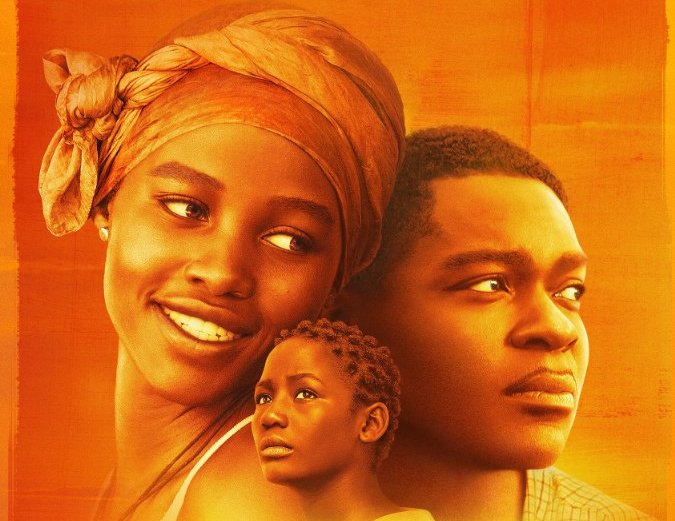



The coach also has a moral story. A religious man, he is working at the Christian ministry until he gets a job at an engineering firm. However, he falls in love with the faith and determination of these kids and makes a choice based on his heart, rather than his head.
No swearing from what I recall, no alcohol, little sex (one scene with the coach and his wife in bed snuggling and kissing). It shows the harshness of slum life, without having to go into graphic detail. There is a little blood, but it comes from an accident rather than through violence.
I recommend this movie, not only to Christians and chess fans, but to anyone who liked movies like “Rudy.”
My Ratings: Moral rating: Good / Moviemaking quality: 4